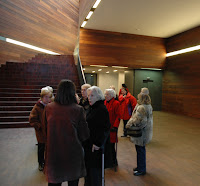I love Antwerp. I nearly bought a wonderful house there once but it wasn’t meant to be. Anyway, I was in Antwerp recently and I decided to visit the Fashion Museum. The museum currently runs an exhibition on Delvaux, Belgian manufacturers of handbags since 1829. After some initial confusion - the public at the exhibition was just about as old as the house Delvaux itself and I feared that I had mistakenly entered some luxury geriatric ward – I climbed the impressive wooden staircase and entered a room …filled with bags and old people. A glimpse at the info brochure taught me that ‘the creative process behind each bag has remained practically unchanged over the past sixty years’. A quick look at ‘the timeline’ seemed to corroborate that: row upon row of basically the same bag adorned the wall with the minute changes that did occur over time neatly pointed out to the viewer (just in case they might miss them).

Delvaux has from the beginning been closely linked to the Belgian monarchy (they precede it by only one year). By the end of the nineteenth century Delvaux had made it to ‘Gebrevetteerde Hofleverancier’, which basically meant that they could deliver to the Belgian army. After the Second World War Delvaux incorporated the Belgian crown into its corporate logo and it designed the so called ‘Mon Grand Bonheur’ bag as a wedding gift for queen Paola. Its sustained loyalty to the crown was demonstrated in the ‘L’union fait la force – Eendracht maakt macht’ bag.

In 1933 the house was taken over by Franz Schennicke, who had previously been a colonial entrepreneur in Belgian Congo. At the world expo in Brussels in ’58 Belgium was keen to show off its colonial assets. Delvaux supplied the hostesses’ bags. Delvaux prides itself on the fact that it provides luxury handmade goods. In the future these goods will remain handmade, but they will be manufactured in Indochine, o pardon Vietnam - colonial heritage dies hard. Well, at least they stay true to their roots.
In a little recess off the main exhibition room I found the curator’s homage to the expansion of Delvaux territory into France. Around 1989 Delvaux opened its first shop in Paris. Apparently the curators of the exhibition thought it would be an original idea to pile up a load of red handbags (the brochure teaches us that red has been since the beginning one of the main colours of the Delvaux palette and had been especially prominent in the eighties) next to the words ‘Egalité, Liberté, Fraternité’ spelled out in blood red letters.

In France you can sell bags by linking them to the revolution that was sealed with blood. In Belgium glamour is added to luxury goods by connecting them to a monarchy that has earned a fortune by bleeding out a colony. Well, as long as it sells, right? As Kita Ikki taught us: it’s not those who plan the revolution that are the true revolutionaries but those who endure it. Any revolution. For 180 years by now.
No comments:
Post a Comment